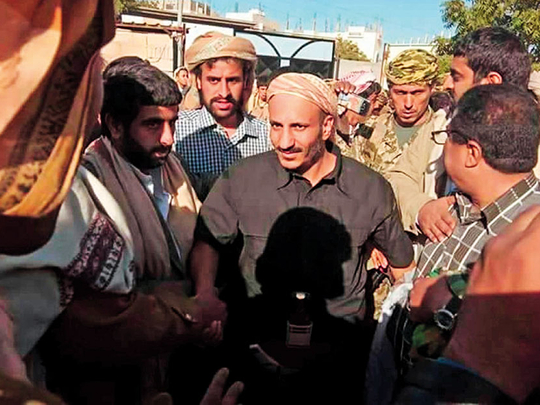
Dubai: A nephew of former president Ali Abdullah Saleh has called for an end to the Yemen war in his first public appearance since his uncle was assassinated by his former comrades, Al Houthi, last month.
Brigadier General Tareq Mohammad Abdullah Saleh, who led a brigade from an elite Yemeni army unit before his uncle was forced to step down in 2012, had been expected to help lead Saleh’s supporters in a fresh fight against the Iran-aligned Al Houthis, who control most of northern Yemen, including the capital, Sana’a.
Addressing supporters in the southern Shabwa province where he had travelled to offer condolences to the family of Aref Al Zouka, who was killed along with Saleh in the attack on Saleh’s residence in Sana’a, Tareq said he remained committed to his uncle’s quest for peace in Yemen.
“We are with what the leader had willed, especially his demand to stop the war, lifting the siege from our people,” said Tareq, who survived the attack by Al Houthi forces.
“We also extend our hands to our brothers, particularly the kingdom of Saudi Arabia, to work to end the war and to restore stability and security to Yemen,” he added.
Initial reports said Tareq was killed in the fighting that erupted after Saleh called on the Saudi-led coalition to end the war, a move interpreted by the Houthis as a betrayal.
But it later emerged that he had survived and had made his way to a safe location.
Zouka was the secretary-general of Saleh’s General People’s Congress party.
Since Saleh’s assassination, Al Houthi militants have launched a massive crackdown targeting members of Saleh’s party, his military loyalists and even his relatives.
Saleh ruled Yemen for more than three decades until he was forced to resign following an Arab Spring uprising in 2011.
He remained in the country, however, and continued to wield power from behind the scenes.
In 2014, his forces allied with Al Houthi militia, despite the fact that as president he had gone to war with them.
There had been simmering tensions between the two awkward allies in past months that boiled over last week when Saleh suggested he would cooperate with the legitimate Yemeni government of Abd Rabbo Mansour Hadi — he was assassinated shortly after.
On social media, members of Saleh’s party who managed to escape from Sana’a said that senior members of Saleh’s party were either executed or placed under house arrest by Al Houthis.
While most analysts say that Saleh’s slaying could give Al Houthis the upper hand in the short term, the broken alliance between Al Houthis and forces loyal to Saleh appears to be permanent, which will help the Yemeni government and its backers in the Saudi-led coalition weaken their grip on the country.
While politically Al Houthis would have absolute control going forward, they are likely to lose territories given the reduction in manpower.
The Saudi-led Arab coalition entered the Yemeni war in 2015 just months after an Al Houthi coup forced Hadi out of power.
He later was able to escape house arrest and flee to Aden where he temporarily shifted government headquarters.
Since then, the coalition has gained back 86 per cent of Yemeni territory but major population centres still remain under Al Houthi control.
Saudi Arabia and the US have accused Iran of illegally smuggling weapons into Yemen to sustain Al Houthi war efforts.
One such Iranian-made ballistic missile was fired towards Riyadh last month.
Although it was intercepted, Riyadh called it an ‘act of war’. The war has cost the lives of thousands of Yemenis and pushed the Arab world’s poorest country to the brink of famine.












